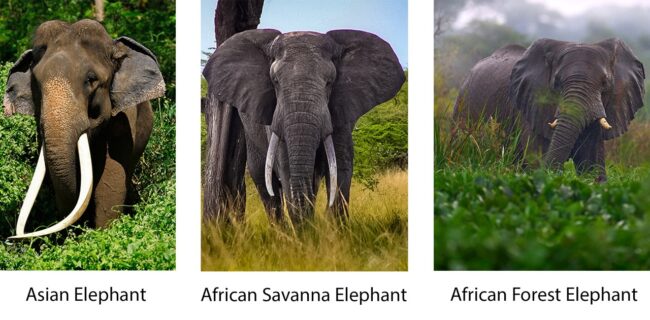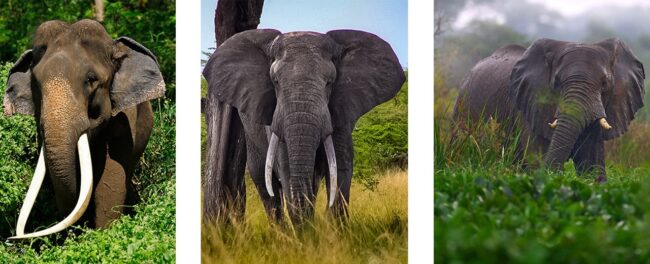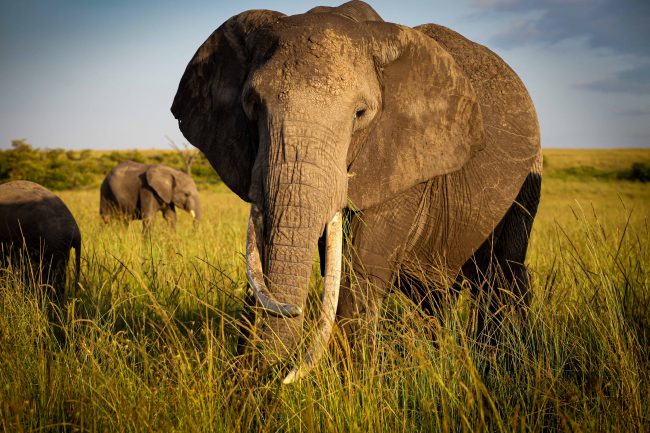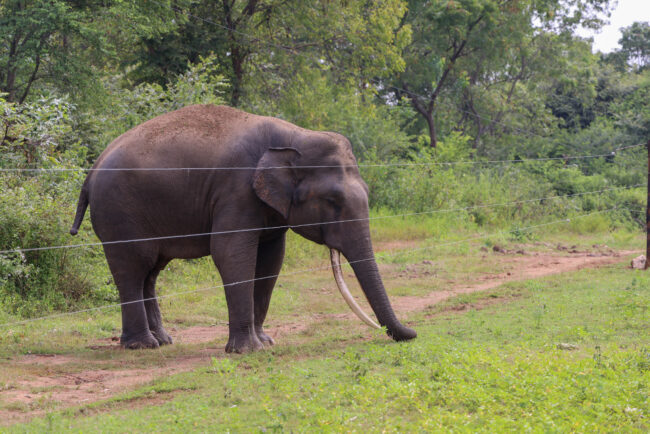Why Care About Elephants?
Elephants face a dire risk of disappearing, with African elephant populations having declined by an average of 77% between 1964 and 2016. This includes a staggering 90% decline in forest elephant populations and a 70% decline in savanna elephant populations over the same period. There are only roughly 415,000 African elephants and 50,000 Asian elephants remaining on Earth.
Elephants are much more than just the world’s largest land animals—they are keystone species, meaning their presence and activities are crucial for maintaining the health and balance of the ecosystems they inhabit. They are incredibly intelligent, sentient beings who care about one another and have significant cultural meaning and significance.
What Can I Do to Help Elephants?
Participate in the 10 Day Countdown leading up to World Elephant Day on August 12, by taking action in one of these ways each day:
- Donate to World Elephant Day:
This helps support grassroots organizations, raise awareness, and educate people about the urgent challenges elephants face. Your contribution helps us connect communities, share information, and promote actions that make a difference for elephants and their habitats around the world. - Sign the Pledge:
Sign the pledge to protect elephants worldwide. - Say No to Ivory and Wildlife Products:
Do not buy ivory or products made from elephants or other wildlife. Being an elephant-aware consumer helps reduce demand and poaching. Ivory bans are now in effect in several U.S. states, with more considering legislation. - Support Community-led Conservation:
Support community-led conservation to eventually become financially self-sufficient from international government granting agencies, by establishing income generating initiatives at the local level. - Support Conservation Organizations:
Donate to these incredible organizations working to protect wild elephant habitats, stop illegal poaching and ivory trade, resolve human-elephant conflicts, build sanctuaries for domesticated elephants, track elephants and so much more. - Promote Ethical Elephant Tourism:
Choose eco-tourism operators that respect elephants and contribute to conservation projects. Avoid places that exploit or abuse elephants for entertainment or profit. Ethical tourism supports local economies, deters poaching, and allows you to experience elephants responsibly. - Learn and Educate Others:
Study elephants’ role as keystone species and their importance in ecosystems. Share this knowledge in schools, communities, or social groups to inspire collective action. - Spread Awareness on Social Media:
Follow and use hashtags like #WorldElephantDay to share facts, stories, and calls to action. - Practice Sustainable Consumption:
Choose fair-trade or shade-grown coffee, avoid products with unsustainable palm oil, and buy wood certified by the Forest Stewardship Council (FSC) to help protect elephant habitats from deforestation. - Host & Engage in Local Advocacy and Events:
Participate in or organize events around World Elephant Day (August 12), start study groups, or host fundraisers to raise awareness and support elephant conservation. You can submit your events here. - Embody Elephant Values:
Appreciate elephants’ intelligence, empathy, and social bonds. Let these qualities inspire your own actions and interactions.
“Elephants cannot be manufactured. Once they’re gone, they cannot be replaced.”—Dr. Iain Douglas-Hamilton, DPhil, CBE, Founder and CEO of Save the Elephants
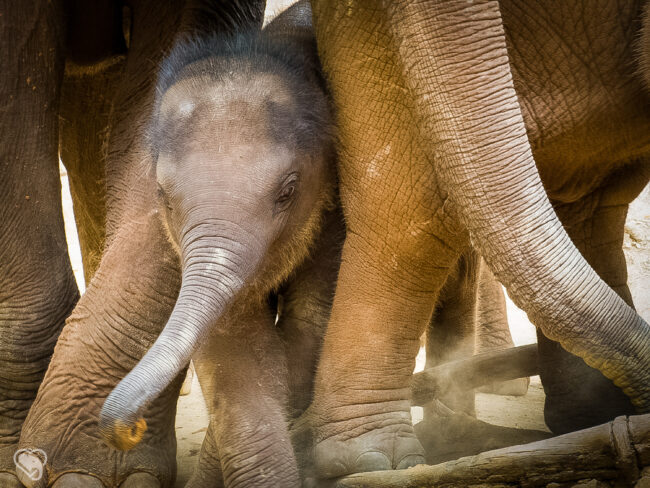
photo: Patricia Sims
Why Are Elephants Important?
Elephants are Keystone Species:
- Elephants have a disproportionately large impact on their ecosystems, shaping landscapes and maintaining ecological balance.
- They prevent savannahs from becoming dense woodlands by feeding on young trees and shrubs, preserving open grasslands vital for many species.
- Elephants create and expand waterholes by digging in dry riverbeds and termite mounds, providing essential water sources for numerous animals during droughts.
- Their movement through dense vegetation creates pathways that allow smaller animals to travel and access resources.
- Elephants are key seed dispersers, spreading seeds through their nutrient-rich dung, which supports forest regeneration and biodiversity.
- Their footprints collect rainwater, forming microhabitats that sustain amphibians, insects, and other small creatures.
- The loss of elephants would trigger cascading ecological effects, disrupting habitats, reducing biodiversity, and threatening many species dependent on these environments.
Deep Cultural Significance:
Elephants hold profound cultural and spiritual importance in many societies. In countries like Thailand, they symbolize strength, wisdom, and good fortune, celebrated in festivals and honored as sacred animals. Across Africa, elephants feature prominently in folklore as emblems of leadership, dignity, and protection. This cultural reverence inspires respect and drives conservation efforts, recognizing elephants as both ecological pillars and cultural treasures.
Sentient Beings with Complex Intelligence:
Elephants are highly intelligent and emotionally complex creatures, capable of empathy, grief, and sophisticated social interactions. Their strong family bonds and problem-solving skills highlight their intrinsic value beyond ecological roles. Recognizing elephants as sentient beings underscores the ethical imperative to protect them from poaching and habitat loss, ensuring they continue to thrive in the wild.
“I have spent hours and hours watching elephants, and come to understand what emotional creatures they are…it’s not just a species facing extinction, it’s massive individual suffering.”– Dr. Jane Goodall
What Threatens Elephants?
Poaching:
Poaching remains the most urgent threat to African and Asian elephants, driven primarily by the illegal ivory trade. Despite international bans on ivory, demand continues to fuel the killing of tens of thousands of elephants each year. Poachers target both males and females, which severely disrupts elephant populations and their ability to recover. Forest elephants, in particular, have experienced catastrophic declines, with some areas losing over 60% of their populations within a decade.
Habitat Loss and Fragmentation:
Expanding human settlements, agriculture, infrastructure development, and resource extraction are rapidly shrinking and fragmenting elephant habitats. This limits the space elephants need to roam, feed, and migrate, reducing their ability to sustain healthy populations and recover from declines.
Human-Elephant Conflict:
As elephants lose habitat, they increasingly come into contact with humans, often raiding crops and damaging property. This leads to retaliation by farmers and communities, resulting in injury, death, or displacement of elephants, as well as economic and safety impacts for people.
Climate Change:
Changing climate patterns exacerbate habitat degradation and water scarcity, stressing elephant populations and their ecosystems. Droughts and altered vegetation growth impact food and water availability, making survival more difficult.
Unethical Tourism:
Poorly managed tourism can disturb elephant behavior and habitats, causing stress and disrupting natural activities. Practices such as elephant rides or close human interaction without proper welfare standards harm elephants physically and psychologically.
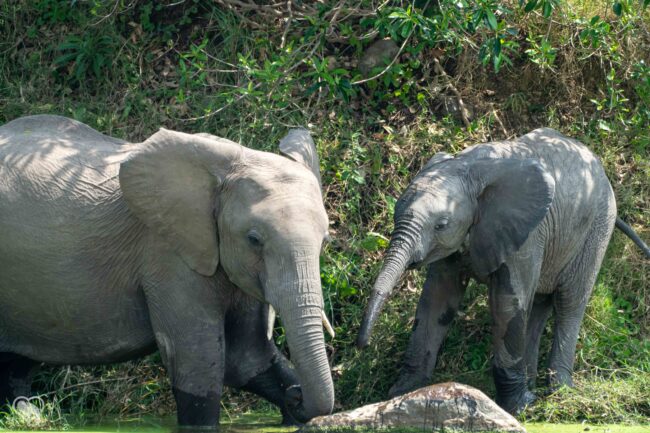
photo: Patricia Sims
Matriarchal Society
Elephant societies are matriarchal, centered around the oldest and most experienced female known as the matriarch. She leads a tight-knit herd composed mainly of related females and their young, forming one of the most enduring social bonds in the animal kingdom. The matriarch’s wisdom, gained through decades of experience, is crucial for the herd’s survival. She guides the group to essential resources such as water and food, especially during times of drought or scarcity, and helps the herd avoid dangers by recognizing threats and coordinating defense. Her leadership ensures social harmony, resolving conflicts and fostering cooperation within the group. Male elephants, in contrast, leave the herd upon reaching adolescence (12 to 13 years old) and typically live solitary lives or form loose bachelor groups.
Beyond leadership, the matriarch’s role is vital in maintaining the social fabric of the herd. Female elephants engage in allomothering, a cooperative system where aunts, sisters, and cousins collectively care for calves, significantly increasing their chances of survival. These lifelong bonds among females allow knowledge, survival skills, and traditions to be passed down through generations, creating a resilient and adaptive family unit. The matriarch, therefore, is not only a leader but also the guardian of the herd’s collective memory and culture, embodying the intelligence and social cohesion that are essential for elephants to thrive in the wild.
Big Changes Needed
It’s critical to implement stronger protection policies for wild elephants at both local and international levels of government; stronger enforcement and legislative measures against the poaching and illegal trade of ivory; better management of natural elephant habitats; better education about the vital role of the elephant in ecosystems; more viable alternative economic opportunities for those whose livelihoods depend on elephants; improved treatment for captive elephants; and, where appropriate, reintroduction of captive elephants into protected sanctuaries that allow a natural replenishing of endangered populations. These are just some of the goals that numerous elephant conservation organizations are focusing on around the world to prevent the extinction of wild elephants and the destruction of their habitat, and to improve the quality of life for those elephants in captivity.
Elephants are running out of space and time. Before we know it they will be gone — unless we collectively stop the senseless poaching and consumer demand for ivory, and allocate protected natural habitat in countries where elephants and other wildlife can thrive now, and in the future.
Because without elephants, just what kind of world would it be?
“Without elephants there will be major habitat changes, with negative effects on the many species that depend on the lost habitat.”– Samuel Wasser, University of Washington
How to Help Elephants
Things You Can Do:
- Post about #WorldElephantDay to spread the word about the plight of elephants. Lend your voice to our movement by engaging with our social media!
- Sign the World Elephant Day Pledge to show your support.
- Tweet #BeElephantEthical to promote safe, ethical elephant tourism. Do not support organizations that exploit or abuse elephants and other animals for entertainment and profit.
- Do not buy ivory or other wildlife products. Be an elephant aware consumer.
Currently it’s not legal in California, New Jersey, New York, Hawaii, Oregon, Nevada, and Washington State. Ivory ban legislation is also currently being considered in Nebraska, Pennsylvania, Delaware, and Massachusetts. - Study elephants in their “keystone” role in the environment and interrelationships with plants and other animals because all of nature is interconnected.
- Visit elephants in countries where they live in the wild – tourism benefits the economy, provides needed jobs, deters poachers and abuse, and gives you the opportunity to experience the beauty, intelligence, and emotional capacity of these magnificent giants
- If you wish to experience elephants in their natural environment, choose eco-tourism operators who support local elephant conservation projects and who treat elephants with respect and dignity.
- Learn about and support organizations that are working to protect habitat for wild elephants and finding solutions for human-elephant conflict.
- Support organizations that are working to stop the illegal poaching and trade of elephant ivory and other wildlife products.
- Support organizations that are protecting wild elephant habitat.
- Support organizations that are building natural sanctuaries and alternative habitat for domesticated elephants to live freely.
- Support healthy, alternative, sustainable livelihoods for people who have traditionally relied on elephants, wild animals and natural resources. Learn about indigenous cultures that have traditionally lived in harmony with elephants.
- Be aware of elephant habitat. Do not buy coffee that is not fair-trade or shade-grown, nor products with palm-oil. These commercial crops are grown in plantations that have decimated elephant habitats. Only buy wood products that have been certified by the Forest Stewardship Council, which promotes responsible management of the world’s forests – the natural habitat for elephants and other wildlife.
- Talk about elephants at your school. Initiate an elephant study group to share knowledge and ideas about the plight of elephants and what can be done to ensure their survival into the future.
- What do you love about elephants? Their intelligence, empathy and caring for one another are just a few of their qualities. Embrace these qualities and live them in your own life.
- Use your love of elephants and World Elephant Day, August 12, to start a conversation with the next person you meet. Tie a string around your finger right now so, like an elephant, you don’t forget!
Elephants are living treasures. Nature’s gardeners. Nature’s great teachers.”
– Virginia McKenna OBE, Founder and Trustee Born Free Foundation

